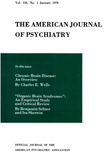SECTARIANISM IN PSYCHIATRY
Abstract
Historically, medicine developed from man's need for relief from pain. In primitive times the medicine man became the first specialist and maintained his role with the tacit agreement of his people through the use of magic. The medicine man who permitted the replacement of magical by rational thinking evolved into the physician and later into the specialist. The medicine man, who resisted the replacement of magical by rational thinking, gave rise to the condition designated as sectarianism. This is defined as an excessive devotion to, or zeal for, a particular belief or orientation, with a quality of rigidity, defensiveness, and intolerance for the beliefs and orientations of others. Characteristically, it involves grandiosity, deification, and the perception of rationalism as dangerous. The contamination of psychiatry by sectarianism has produced a number of harmful effects by prejudicing trainees and practitioners against the advantages of the truly total approach to the patient.
Access content
To read the fulltext, please use one of the options below to sign in or purchase access.- Personal login
- Institutional Login
- Sign in via OpenAthens
- Register for access
-
Please login/register if you wish to pair your device and check access availability.
Not a subscriber?
PsychiatryOnline subscription options offer access to the DSM-5 library, books, journals, CME, and patient resources. This all-in-one virtual library provides psychiatrists and mental health professionals with key resources for diagnosis, treatment, research, and professional development.
Need more help? PsychiatryOnline Customer Service may be reached by emailing [email protected] or by calling 800-368-5777 (in the U.S.) or 703-907-7322 (outside the U.S.).



